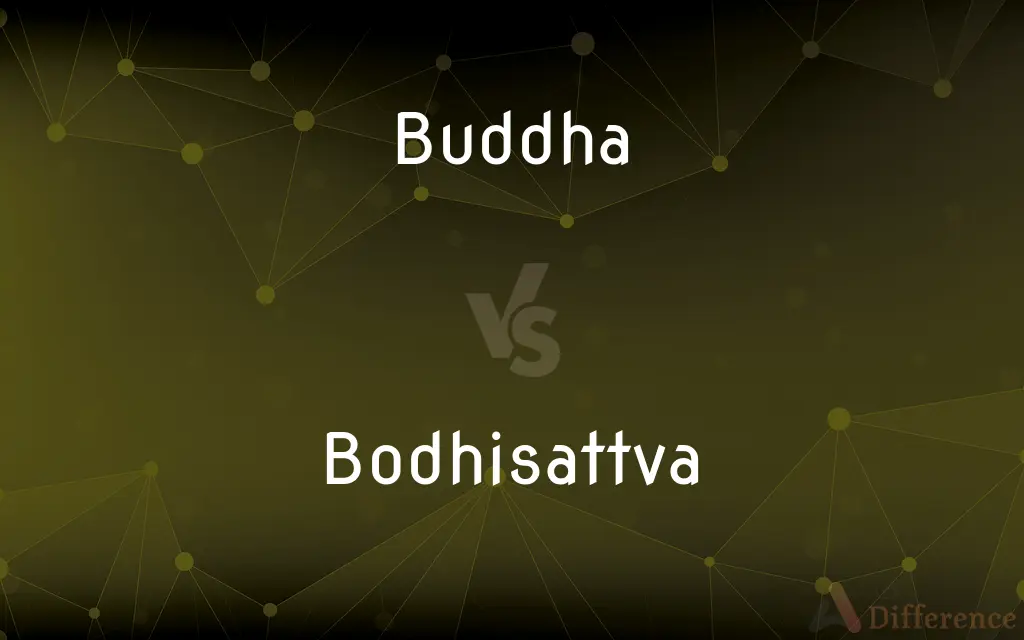Buddha vs. Bodhisattva — What's the Difference?
By Fiza Rafique & Urooj Arif — Updated on March 22, 2024
Buddha refers to an enlightened being who has attained Nirvana and ultimate knowledge, while a Bodhisattva is an enlightened being who chooses to remain in the cycle of rebirth to help others achieve enlightenment.

Difference Between Buddha and Bodhisattva
Table of Contents
ADVERTISEMENT
Key Differences
A Buddha is someone who has reached a state of perfect enlightenment, understanding the true nature of reality and escaping the cycle of suffering and rebirth. On the other hand, a Bodhisattva, while also reaching a significant level of enlightenment and understanding, makes a compassionate vow to delay their own entry into Nirvana.
The concept of a Buddha is central in various forms of Buddhism, with Siddhartha Gautama, the founder of Buddhism, being the most renowned example. After his enlightenment under the Bodhi tree, he spent the rest of his life teaching the Dharma, or the path to liberation. Whereas, the idea of the Bodhisattva is especially prominent in Mahayana Buddhism, which emphasizes the altruistic path of the Bodhisattva as the highest form of spiritual practice. This path involves generating bodhicitta, the intention to attain enlightenment for the sake of all beings, and undertaking the Bodhisattva vows.
Buddhas are often depicted as having achieved a state beyond all suffering and desire, residing in a state of serene detachment from the world. They serve as guides and teachers, illuminating the path to enlightenment for others. Bodhisattvas, while also enlightened, are characterized by their active engagement in the world, compassionately working to alleviate suffering and guide others towards enlightenment. They are seen as accessible and involved in the world's affairs, embodying the virtues of compassion, patience, and self-sacrifice.
While a Buddha has completed their spiritual journey, a Bodhisattva remains intimately connected with the world of suffering. The Buddha's role is often seen as that of a teacher, having transcended the world yet returning to it through teaching. The Bodhisattva, however, is a perpetual traveler on the path, working within the cycle of samsara to help others. Their enlightened actions are driven by compassion and a deep sense of responsibility towards all sentient beings.
Despite the differences in their paths and roles, both Buddhas and Bodhisattvas are revered in Buddhism for their qualities and achievements. The Buddha is respected for attaining enlightenment and sharing the knowledge to liberate others, while the Bodhisattva is admired for their unyielding compassion and commitment to the enlightenment of all beings. The distinction between them lies not in their level of enlightenment, but in their choices regarding Nirvana and their relationship with the world.
ADVERTISEMENT
Comparison Chart
Definition
An enlightened being who has attained Nirvana.
An enlightened being who delays Nirvana to help others.
Path
Achieves enlightenment and escapes the cycle of rebirth.
Chooses to remain in the cycle of rebirth.
Goal
Personal liberation and enlightenment.
Enlightenment of all beings.
Role
Teacher, guiding others to enlightenment.
Compassionate helper, actively aiding others.
Key Virtues
Wisdom, understanding of reality, detachment.
Compassion, altruism, patience.
Spiritual Journey
Culminates in enlightenment and liberation.
Continues indefinitely for the sake of others.
Iconography
Often depicted in meditation, serene and detached.
Depicted engaging with the world, compassionate.
Main Teaching
The Dharma, path to liberation.
Bodhicitta, the intention for universal enlightenment.
Prominence
Central in all forms of Buddhism.
Especially emphasized in Mahayana Buddhism.
Compare with Definitions
Buddha
Teaches the path to liberation.
The Buddha taught the Four Noble Truths as the foundation of Buddhism.
Bodhisattva
Embodies compassion and altruism.
The Bodhisattva ideal is to put others' enlightenment before one's own.
Buddha
Represents the culmination of spiritual journey.
The Buddha's teachings guide followers towards enlightenment.
Bodhisattva
Active in the world, relieving suffering.
Bodhisattvas are depicted as engaging with the world compassionately.
Buddha
One who has achieved enlightenment and nirvana.
Siddhartha Gautama became the Buddha after his enlightenment.
Bodhisattva
An enlightened being who aids others.
Avalokiteshvara is a Bodhisattva known for his compassion.
Buddha
Embodiment of peace and detachment.
The Buddha is often depicted in a state of serene meditation.
Bodhisattva
Practices patience and self-sacrifice.
The Bodhisattva practices are centered around altruism and patience.
Buddha
A title given to the founder of Buddhism, Siddartha Gautama (c.563–c.483 BC). Born a prince in what is now Nepal, he renounced wealth and family to become an ascetic, and after achieving enlightenment while meditating, taught all who came to learn from him.
Bodhisattva
Commits to saving all beings.
A Bodhisattva vows to remain in the cycle of samsara to help all sentient beings.
Buddha
One who has achieved a state of perfect spiritual enlightenment, thereby attaining nirvana.
Bodhisattva
In Buddhism, a bodhisattva ( BOH-dee-SUT-və) is any person who is on the path towards Buddhahood. In the Early Buddhist schools as well as modern Theravada Buddhism, a bodhisattva (Pali: bodhisatta) refers to anyone who has made a resolution to become a Buddha and has also received a confirmation or prediction from a living Buddha that this will be so.In Mahayana Buddhism, a bodhisattva refers to anyone who has generated bodhicitta, a spontaneous wish and compassionate mind to attain Buddhahood for the benefit of all sentient beings.The elaborate concept refers to a sentient being or sattva that develops bodhi or enlightenment — thus possessing the boddhisattva's psyche; described as those who work to develop and exemplify the loving-kindness (metta), compassion (karuṇā), empathetic joy (mudita) and equanimity (upekkha).
Buddha
A representation or likeness of a Buddha.
Bodhisattva
An enlightened being who, out of compassion, forgoes nirvana in order to save others.
Buddha
A human being who has become enlightened. (in Buddhism)
Bodhisattva
(Buddhism) A person who has taken specific lay or monastic vows and who is on the road to perfect knowledge; specifically, one who foregoes personal nirvana in order to help others achieve enlightenment.
Buddha
A statue or image of the Buddha.
Bodhisattva
(Buddhism) An enlightened being existing in a form of existence beyond the ordinary forms of physical reality understood and acknowledged by scientific thought, resembling the Western notion of angels, but with a wealth of its own nuances and expectations. These include the compassionate working for enlightenment of all sentient beings.
Buddha
Marijuana
Bodhisattva
Buddhist worthy of nirvana who postpones it to help others
Buddha
The title of an incarnation of self-abnegation, virtue, and wisdom.
Buddha
Founder of Buddhism; worshipped as a god (c 563-483 BC)
Buddha
One who has achieved a state of perfect enlightenment
Common Curiosities
What distinguishes a Buddha from a Bodhisattva?
A Buddha has attained Nirvana and escaped samsara, while a Bodhisattva delays Nirvana to help others achieve enlightenment.
Why do Bodhisattvas choose to remain in samsara?
Bodhisattvas remain out of compassion, intending to help all sentient beings reach enlightenment.
How are Buddhas and Bodhisattvas depicted differently in art?
Buddhas are often depicted in serene meditation, while Bodhisattvas may be shown in active poses, emphasizing their engagement with the world.
What is the significance of the Buddha's enlightenment?
The Buddha's enlightenment represents the ultimate understanding of reality and the end of suffering.
Do all forms of Buddhism recognize the Bodhisattva path?
The Bodhisattva path is especially emphasized in Mahayana Buddhism, though all Buddhist traditions recognize the value of compassion and altruism.
Can a Bodhisattva become a Buddha?
Yes, a Bodhisattva can become a Buddha once they fulfill their vows to help others achieve enlightenment.
How do Bodhisattvas help others?
Bodhisattvas help others through teaching, compassion, and sometimes miraculous interventions.
What is the ultimate goal of a Bodhisattva?
The ultimate goal of a Bodhisattva is the enlightenment of all sentient beings.
Is the Bodhisattva path accessible to everyone?
In Mahayana Buddhism, the Bodhisattva path is encouraged for all practitioners as the highest form of spiritual practice.
Can someone choose to follow the Bodhisattva path?
Yes, individuals can choose to follow the Bodhisattva path by generating bodhicitta and taking the Bodhisattva vows.
Share Your Discovery

Previous Comparison
Lake vs. Mere
Next Comparison
Leather vs. FabricAuthor Spotlight
Written by
Fiza RafiqueFiza Rafique is a skilled content writer at AskDifference.com, where she meticulously refines and enhances written pieces. Drawing from her vast editorial expertise, Fiza ensures clarity, accuracy, and precision in every article. Passionate about language, she continually seeks to elevate the quality of content for readers worldwide.
Co-written by
Urooj ArifUrooj is a skilled content writer at Ask Difference, known for her exceptional ability to simplify complex topics into engaging and informative content. With a passion for research and a flair for clear, concise writing, she consistently delivers articles that resonate with our diverse audience.














































